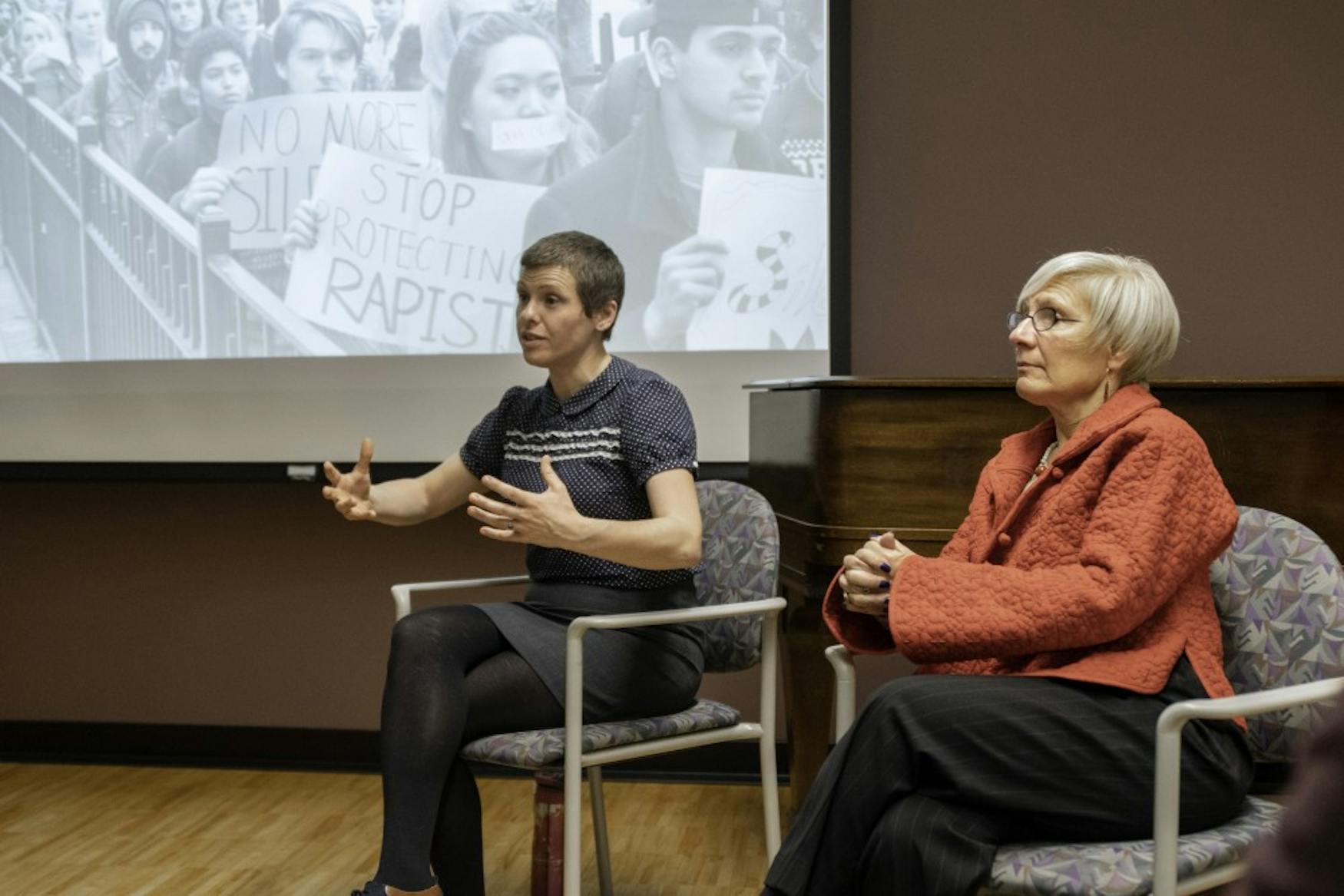Berklee professors united after Globe’s revelations
Panelists discussed Berklee staff, student and administrator reactions to a Boston Globe article published last year which revealed that 11 Berklee professors had been terminated after sexual harassment and abuse allegations. The event, titled “Sexual Harassment: Case Study of a College in Distress,” featured members of the Feminist Faculty Alliance of Berklee College of Music, as well as Jessica Teperow, an expert on domestic violence, speaking at the Women’s Studies Research Center last Thursday.
Alicia Bower, an assistant professor of psychology at Berklee and an FFA member, began by providing context for the event. On Nov. 8, 2017, the Boston Globe published an article titled “Berklee let teachers quietly leave after alleged sex abuse, and pushed students for silence.” Bower explained that the release of this article caused an outcry in the Berklee community; students created a petition called “Don’t let Berklee College of Music Keep Sexual Assault a Secret” that gained nearly 5,000 signatures. Bower also said the students organized a peaceful protest in which they planned to hold signs at Berklee’s “State of the College” address demanding that the administration take more immediate action to prevent sexual misconduct.
According to Bower, Berklee Faculty Union President Jackson Shultz sent an email condemning sexual misconduct that garnered over 100 responses from faculty members. “Unfortunately, some replies … highlight the reality that not all faculty understand power dynamics in the student-mentor relationship,” Bower said.
At the time, Bower said, female faculty began emailing each other for support. They decided to meet up the Sunday after the article was published; this became the first meeting of the FFA. “The FFA just kind of naturally emerged as a group that could field student questions, consult our own knowledge and experience as a group, respond to student concerns and then serve as this kind of supportive role between students and administration.”
At that Nov. 11 meeting, the FFA sent a statement to their colleagues and to the administration that contained a number of demands, including that both Berklee’s student body and faculty be 50 percent female by 2025. Last year, according to Sally Blazar, an English professor at Berklee, the student body was 42 percent female, the highest proportion of female students enrolled in Berklee’s history. Blazar estimated that 20 years ago, the student body was only around 20 or 25 percent female.
The next day, instead of holding the “State of the College” address that was planned for that day, the Berklee administration decided to host a forum. Bower said that the forum lasted more than three hours and students asked questions, shared experiences and presented demands. The FFA also read aloud their statement.
The following week, Bower said, Berklee College of Music’s president, Roger H. Brown, sent out an email to students about changes the college would be making. Although the email promised increased transparency and a more visible equity policy and process, Bower said that the statement put a disproportionate amount of responsibility on students to make changes, rather than on the administration. “There’s still a good amount of healthy skepticism, but there is also a sense that the administration’s promises for change are sincere,” Bower said.
Brown was in the audience at the panel, and spoke about his experience in the Q&A session afterwards. He said that when he became president, he quickly learned about faculty members who had partaken in sexual misconduct and then terminated them.
Brown admitted to initially having a negative reaction to the Boston Globe article. According to him, the story said there was “a culture of blatant sexual harassment at Berklee” and that the faculty members who had engaged in misconduct had been “allowed to quietly leave.” Brown, on the other hand, had thought the administration was not the problem, given that they had been the ones to terminate the faculty members.
“When the Globe article happened, my first reaction, I’ll be honest, was very defensive,” Brown said. “But I had to get over that defensiveness because the truth is, these people did horrible things.” He described the situation as one of the “biggest challenges I’ve faced as a leader in my life.”
Brown said that he met with as many of the survivors as he could, and he shared what he learned from meeting with the victims. “Survivors feel like the institution hates them and has turned on them, and there’s a real tendency to feel all this shame,” he said. “Not only do we not dislike you for what you did, you did us a huge service because this person who got terminated would have done the same thing to half a dozen other people,” Brown told the survivors.
Teperow, director of Prevention Programs at Reach Beyond Domestic Violence, spoke about the effects that sexual misconduct has on victims. “When you experience a trauma, you experience a profound and meaningful loss of control. … That’s incredibly important for the administration to consider when thinking about how they are then going to respond to these experiences.”
Blazar discussed Berklee’s administrative response and the changes they began making in spring 2018. Some of these changes included doing training courses, creating a working group and diversifying leadership. “One of the things that really struck me was how much work is being done that I had no clue about, and that was really nice to know,” Blazar said.



Please note All comments are eligible for publication in The Justice.